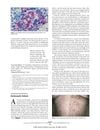 19 citations,
July 2020 in “Journal of drug delivery science and technology”
19 citations,
July 2020 in “Journal of drug delivery science and technology” Nanoemulsions with minoxidil and clove oil effectively target hair follicles for better alopecia treatment.
 October 2023 in “Frontiers in medicine”
October 2023 in “Frontiers in medicine” Targeted immunotherapy could be a promising new treatment for hair regrowth.
 September 2023 in “medRxiv (Cold Spring Harbor Laboratory)”
September 2023 in “medRxiv (Cold Spring Harbor Laboratory)” Long-COVID has diverse, long-term health impacts, especially in young people.
 April 2019 in “International journal of research in dermatology”
April 2019 in “International journal of research in dermatology” A child with rough nails also had hair loss and allergies.
 January 2017 in “Postepy Dermatologii I Alergologii”
January 2017 in “Postepy Dermatologii I Alergologii” The CRH/CRH-R1 system might be involved in causing lichen planus.
 24 citations,
July 2019 in “Cochrane library”
24 citations,
July 2019 in “Cochrane library” Some treatments like methotrexate with prednisone might help juvenile morphea, but more research is needed to confirm.
 24 citations,
June 2010 in “Clinics in Dermatology”
24 citations,
June 2010 in “Clinics in Dermatology” Taking too many vitamin and mineral supplements can cause serious health problems.
 10 citations,
July 2002 in “Australasian Journal of Dermatology”
10 citations,
July 2002 in “Australasian Journal of Dermatology” Careful management of blood thinners is crucial for lupus patients with APS.
 3 citations,
January 2012 in “Wageningen Academic Publishers eBooks”
3 citations,
January 2012 in “Wageningen Academic Publishers eBooks” Hair health depends on various factors and hair loss can significantly affect a person's well-being; understanding hair biology is key for creating effective hair care treatments.
 2 citations,
December 2022 in “PNAS nexus”
2 citations,
December 2022 in “PNAS nexus” SCD-153 shows promise as an effective topical treatment for alopecia areata.
 July 2023 in “The Egyptian Journal of Hospital Medicine ”
July 2023 in “The Egyptian Journal of Hospital Medicine ” Alopecia areata is a hair loss condition caused by immune factors and can be treated with JAK inhibitors.
 January 2020 in “Asian journal of applied science and technology”
January 2020 in “Asian journal of applied science and technology” Good nutrition is crucial for health and preventing disease, and supplements can help prevent nutrient deficiencies.
 34 citations,
October 2011 in “Pathology Research International”
34 citations,
October 2011 in “Pathology Research International” Behçet's Disease may be caused by genetic and environmental factors leading to abnormal immune responses, and stress management and new treatments could improve patient outcomes.
 28 citations,
July 2002 in “Australasian Journal of Dermatology”
28 citations,
July 2002 in “Australasian Journal of Dermatology” Lupus can look like hair loss from alopecia areata but needs different treatment.
 11 citations,
September 2015 in “Medical Principles and Practice”
11 citations,
September 2015 in “Medical Principles and Practice” In a Tuscan pediatric clinic, 7.19% of children had hair or scalp disorders, with nonscarring alopecia being the most common.
 10 citations,
February 2006 in “Archives of dermatology”
10 citations,
February 2006 in “Archives of dermatology” A man's chest hair turned white after a shingles infection, possibly due to virus-damaged pigment cells.
 7 citations,
December 2017 in “Open Access Macedonian Journal of Medical Sciences”
7 citations,
December 2017 in “Open Access Macedonian Journal of Medical Sciences” Biofibre® hair implants are safe and effective for alopecia when proper procedures are followed, with high patient satisfaction.
 7 citations,
July 2011 in “Survey of Ophthalmology”
7 citations,
July 2011 in “Survey of Ophthalmology” The document concludes that periocular hair disorders have various causes and treatments, and proper evaluation by specialists is important for management and prognosis.
 July 2003 in “Journal of Cutaneous Medicine and Surgery”
July 2003 in “Journal of Cutaneous Medicine and Surgery” Treating psoriasis with UVB light three times a week is faster than twice a week, and certain medications and lifestyle factors affect psoriasis treatment outcomes.
 1 citations,
August 2021 in “Педиатр”
1 citations,
August 2021 in “Педиатр” Endocrine diseases in children often cause skin changes like dryness, redness, acne, hair loss, and more.
286 citations,
August 2007 in “Journal of Clinical Investigation” Alopecia areata is an autoimmune disease where T cells attack hair follicles.
 August 2023 in “Iranian Journal of Clinical Infectious Diseases”
August 2023 in “Iranian Journal of Clinical Infectious Diseases” Most skin issues were due to COVID-19, with some caused by vaccines or treatments, and were categorized into five types.
 July 2023 in “Journal of Cosmetic Dermatology”
July 2023 in “Journal of Cosmetic Dermatology” Ethosomes could improve how well skin treatments work, but more research is needed on their safety and stability.
38 citations,
January 2017 in “PPAR Research” PPAR-γ helps control skin oil glands and inflammation, and its disruption can cause hair loss diseases.
 1 citations,
June 2022 in “JAAD case reports”
1 citations,
June 2022 in “JAAD case reports” A woman developed a severe skin reaction after getting a birth control implant.
 March 2024 in “Dermatologic therapy”
March 2024 in “Dermatologic therapy” Fire Needle Therapy may help bring back skin color in vitiligo by affecting cell growth signals.
 July 2022 in “JEADV Clinical Practice”
July 2022 in “JEADV Clinical Practice” The document concludes that different types of permanent hair loss conditions are related and early treatment is key to preventing further damage.
20 citations,
December 2021 in “Plants” Tamarix aphylla may be effective for various medical conditions, but more research is needed to confirm its safety and effectiveness.
15 citations,
February 2021 in “Frontiers in immunology” Leptin, a hormone from fat cells, affects immune responses and can influence skin diseases and hair growth.
 June 2024 in “Skin Research and Technology”
June 2024 in “Skin Research and Technology” hsa-miR-193a-5p may help diagnose and treat alopecia areata.


























